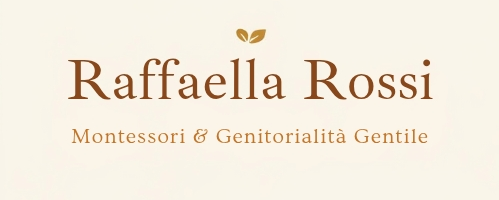Traditional parenting and Montessori Method
Often parents ask me to explain in a few words what the Montessori method is all about, especially in the context of parenting. One of the ways I find most effective is to compare it to what I call “traditional” educational methods. Obviously, by using this term my intention is not to judge unsuitable parents or educators who do not follow the Montessori method. I met great parents who had never heard of Maria Montessori. Likewise, educators who used this term without any knowledge. With the term “traditional” I refer exclusively to those methods and practices that consolidated over time to the point of not being questioned anymore even though they have negative effect on children. In reality, each of us has adapted at least once without realizing they have nothing to do with the real needs of children.
The parenting job
“I’m doing my best, isn’t that enough?” is a common thought among parents. There is no doubt that every human being can only do no more than their best and that the ultimate goal is not perfection. We are not machines but humans with feelings, desires and personalities. The attitude I consider dangerous among adults who decide to have children is “We will figure it out”, the belief that to be parents, you just have to give birth to children and the rest will come by itself. Too many adults don’t feel the need to learn but assume they will figure out what to do, little by little.
Nobody wants to show up on the first day of a new job without having the knowledge or skills to tackle it, right? So why do many people leave to chances a job as delicate and important role as being a parent?
The Montessori method
What I appreciate most about the Montessori approach to parenting and teaching is that it follows a deep understanding of the needs of children. This knowledge provides adults with the necessary tools to create a healthy environment and the best conditions for development. Unfortunately good intentions, if not supported by a basic understanding of early childhood needs, may not be enough and, at times, counterproductive. Often our behaviour as adults is unknowingly guided by beliefs and built in our childhood. For example, if our parents disciplined us with threats and fear, it is likely that we will end up following the same approach, in a more or less conscious way, without asking ourselves whether it is an effective or valid method. This parental style is among the most common and hard to unhinge because deeply rooted in ourselves.

Traditional parenting style
The authoritarian parenting style is consolidated because it has passed on from generation to generation. It is often so ingrained in our being that we don’t even realize we’re raising our voices or wonder what effect using the threat can have to force a child to do something. The repercussions of this parental style do not appear only immediately but spread into adulthood and can reveal themselves in different aspects, such as lack of self-esteem, insecurity or difficulty managing emotions. The Montessori method not only starts from a solid awareness of the real needs of childhood but also differs from the traditional approach in the interaction with children. Let’s see some examples.
Relationship between adults and children
In traditional education, adults place themselves in a position of superiority, set the rules and demand respect from the child. The Montessori method, on the other hand, aims to create an equal relationship based on trust and respect. Adults see children as resilient human beings, capable of expressing and choosing what they need. They respect the children by validating their feelings, communicating with kindness and supporting their interests. In the family, children actively contribute to everyday life, to household chores and use real utensils, like glass and ceramics, instead of plastic objects. Feeling respected and listened to is fundamental in the first years of life when the foundations of our personality are built.
Trusting the internal motivation
Children have an innate desire to learn and develop. The role of the adult is to listen, understand and guide children with kindness towards the development of individuality, provide opportunities for learning and active interaction with the environment and protect their natural curiosity and desire for exploration. When children arrive in family, adults modify the houses by adding barriers to stop children and avoid accidents. Within an environment that is not suitable for children, adults have to constantly tell children off. By creating an environment that safely invites exploration, the adult frees himself from the role of policeman in their own house, while also protecting the child’s curiosity and natural desire to learn.
Every child is different
Traditional educational methods require children to adapt to the demands and expectations of adults in a uniform manner, regardless of individual differences. The Montessori parental style, on the other hand, is based on general principles that guide us in adapting the environment and ourselves to the individual and unique needs of the child. The motto of the Montessori method, “Follow the children”, comes from the belief that every human being is different. Following children means both being aware of the fundamental stages of childhood development that are common to all, and recognizing and accepting that each child will go through these stages differently and uniquely.
Holistic development
Traditional education tends to compartmentalize the different areas of development and does not take into account the influence of emotional development and well-being on growth and learning. The Montessori method promotes a holistic view of development where every aspect of growth is important and influences others. Physical development is ensured by offering continuous opportunities for movement; emotional development is promoted thanks to empathic and kind adults who do not repress the needs of children but respect them, guiding them as they navigate the strongest feelings. The practical and manipulative approach satisfies the need to learn by doing, supporting cognitive development and encouraging the development of creativity and critical thinking.
independence
The survival of a newborn in the first months of life depends on the adult, who is responsible for feeding, keeping warm and taking care in all respects. Traditional educational methods mistake this physical addiction for inability, surrounding children with adults who continually do things for them and don’t give them a chance to try. In reality, in the first six years, children are motivated by an innate desire to do it on their own, become physically independent and in the right conditions, they find themselves capable and adept. The Montessori method recognizes and values this need by creating an environment that encourages them to dress, eat, wash and even contribute to housework. Independence is supported step by step, creating a balance between what they can do for themselves and when they need us. Doing things by oneself causes great satisfaction in children and supports the development of self-esteem.
Discipline
The Montessori method considers discipline as a process that leads the child, thanks to the balance between freedom of choice, independence of movement and limits set by the adult, to interact positively with the surrounding environment and others. In traditional educational methods, the parent is an authority figure who has the task of imposing the rules and enforcing them, often in an unchallenged way. According to the Montessori method, true discipline is not driven by the desire to satisfy those around us or by fear but comes from an internal motivation and an understanding of the rules of living in society. Freedom and discipline cannot exist separately. As children are follow and develop their interests, are free according to their level of development, guiding, redirecting and modifying the environment, children come to internalize the rules and respect them by understanding the reasons.
Recomended readings:








One Comment
Comments are closed.